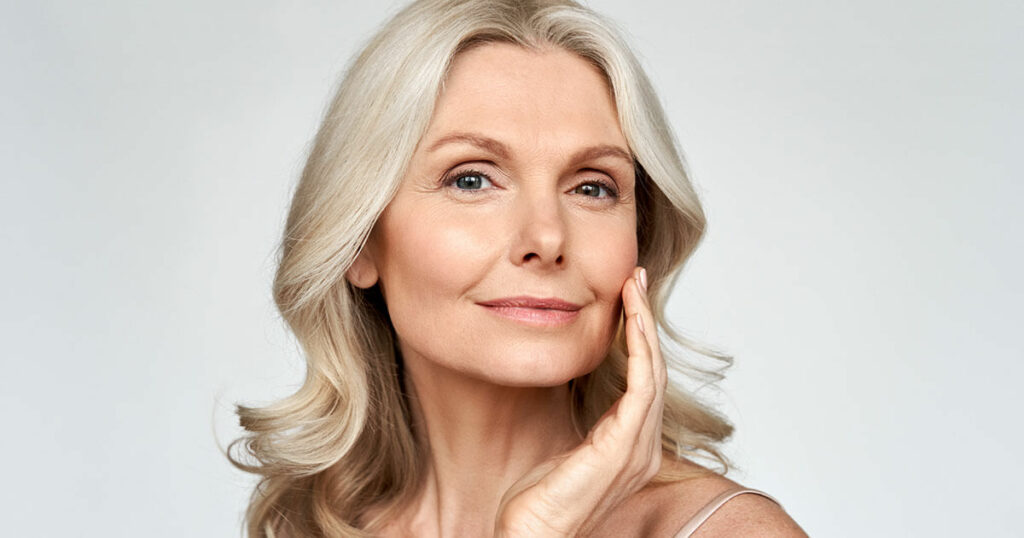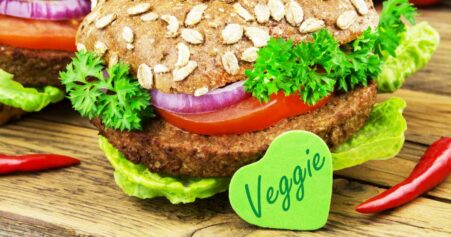Table of Contents
Vegan Diet and Skin – What is the link?
When wrinkles start to appear, many people wonder what they can do to improve their skin. But even before that, dryness, redness, blemishes and poor wound healing can limit your sense of well-being. In addition to genetics, there are other factors that can affect the appearance of your skin, including diet.
How can a vegan diet improve your skin?
What Influences Skin Aging?
Simply put, the skin is made up of three layers: Epidermis, dermis, and subcutaneous tissue (fat layer). Their composition determines how the skin feels and looks. There are several ways to assess skin quality. These include measuring water content and loss, as well as the thickness of the layers. The accuracy of these methods varies and they are often not standardized. Therefore, study results must be interpreted with caution, taking into account the methods used (Parke et al., 2021).
There are several factors that can cause changes in the skin (Cao et al., 2020):
- oxidative stress due to intracellular generation of reactive oxygen species (ROS);
- DNA damage and gene mutations, mainly due to UV radiation (photoaging);
- telomere shortening (part of the DNA-protein complex) due to UV-induced ROS;
- microRNA (miRNA) regulate, among others, skin fibroblasts, which may affect hyaluronic acid synthesis;
- accumulation of advanced glycation end products (AGEs) which are formed by the reaction of sugars, proteins and lipids in the body; affect protein function in the skin. You’ll learn more about this later in this article;
- celular inflammation caused by UV radiation which leads to oxidative stress in skin cells, which damages cells and promotes fat oxidation and eventually cellular inflammation; when inflammation is too high, macrophages secrete pro-inflammatory factors as well as ROS → accelerated skin aging.
You cannot completely avoid all of this, it is part of the natural aging process. But what you can do is to delay the process by paying attention to external factors.
Non-Nutritional Factors Affecting the Skin
Your lifestyle can affect the appearance of your skin. One big aspect is avoiding sun exposure. UVA radiation, for example, reduces the synthesis of hyaluronic acid, which reduces skin hydration and can promote wrinkles. UVB radiation can cause DNA damage and thus promote skin aging. It can also cause pigment spots. So remember to protect yourself from the sun: use sunscreen, cover up and stay in the shade.
Smoking also has a negative effect due to the formation of ROS. So do something good for your lungs, your skin and your overall health and quit smoking.
Alcohol can increase skin permeability, damage the skin barrier and affect the lipid composition of the skin. Abstinence from alcohol and smoking has been shown to delay skin aging (Cao et al., 2020).
Vegan Diet and Skin
If you are on a vegan diet, you are probably wondering if and how the diet affects your skin. There seems to be some correlation between diet and skin appearance. However, the factors mentioned above, especially the use of creams and other skin care products, probably are the most important influencing factors.
How Does a Vegan Diet Affect the Skin?
Nutrient deficiencies can have negative effects not only on general health, but also on the skin. In studies by Fusano and colleagues, vegans were shown to have poorer wound healing, more unsightly scarring, and worse changes from skin treatments (Fusano et al., 2021a; Fusano et al., 2021b). One of the possible reasons, according to the researchers, may be a lower percentage of body fat. This is because the plump appearance of skin is mainly due to the fat layers. With a low body fat percentage, the face often appears sunken and wrinkles are deeper. A lower intake of fat in the diet may also contribute to a lower absorption of fat-soluble vitamins, which have an antioxidant effect and may contribute to better skin appearance. Additionally, deficiencies in other nutrients such as protein, iron, and zinc, all of which are potentially critical nutrients in vegan diets, could have a negative impact on the skin.
However, there is no clear evidence as to whether vegans have more or fewer wrinkles than those on a mixed diet. As is so often the case: It is not the diet alone that determines the skin’s appearance, but the way in which it is implemented.
This is the problem, but also the potential of a vegan diet for the skin. While a lack of nutrients has a negative effect on the skin, this can be counteracted with a targeted vegan diet. But how? Read on to find out.
Improve Your Skin with a Vegan Diet
As you can see from the previous descriptions, it is important to avoid nutrient deficiencies with a vegan diet. Just for your general health, you should have your nutritional status checked regularly, for example with blood tests. In the following you will find out which substances are particularly important for the skin.
Macronutrients
Since the outermost layer of the skin (stratum corneum) is composed of a lipid matrix, dietary fat intake can influence it. A high content of polyunsaturated fatty acids seems to be beneficial. This is supported by in vitro and animal studies. Intervention studies show benefits with regular consumption of omega-3 and omega-6 rich oils. For example, a combination of flaxseed oil, borage oil and hempseed oil has been shown to have positive effects on skin hydration (Parke et al., 2021).
The omega-3 fatty acids DHA and EPA, found in certain algae oils, also show potential, especially when dietary intake is inadequate. These fatty acids could also be added to acne therapy in doses of 3-4 g per day (Sardana and Sachdeva, 2021). However, because responses to fatty acids are highly individualized, no general intake recommendations can be made (Balić et al., 2020).
Just as a very low-fat diet can be detrimental, a high-fat diet can also delay skin healing and cause skin damage through oxidative stress, according to in vitro and animal studies. In particular, high levels of saturated and trans fatty acids may exacerbate acne (Cao et al., 2020; Sardana and Sachdeva, 2021).
Since the skin is also largely composed of protein, a deficiency can have a negative impact on skin health. However, a true protein deficiency is unlikely on a vegan diet – even though some may not believe it 😉 What you can do is make sure you get all the essential amino acids, especially lysine, proline, and glycine. These are important components of collagen, the main protein in the skin. See Table 1 for good vegan sources of these three amino acids.
Table 1: Vegan Sources of Lysine, Proline and Glycine
| Lysine | Proline | Glycine |
| legumes | soy protein | soy protein |
| almonds | nutritional yeast | seitan |
| oats | wheat flour | pumpkin seeds |
| poppy seed | peanuts | |
| corn | amaranth |
There are considerations derived from studies that dietary glycine intake may not be sufficient to produce beneficial effects on the skin, regardless of the dietary form. This is based on in vitro studies and mechanistic processes. Therefore, dietary glycine supplementation may provide increased uptake and thus beneficial effects on the skin.
However, there is no clear evidence that glycine supplementation in a (vegan) diet is necessary or helpful for the skin (Meléndez-Hevia et al., 2009).
Collagen is also discussed as a supplement for skin improvement, such as effects on hydration and wrinkle depth. Mechanical and animal studies show potential, as do some human studies with collagen peptides (1-3 g). Co-administration of vitamin C seems to improve absorption and be relevant for the effect (Muzumdar and Feerenczi, 2021).
But collagen is of animal origin. So what can vegans do for their skin? They can pay special attention to their intake of the amino acids lysine, proline and glycine. There is some evidence that dietary glycine intake may not be sufficient to have a positive effect on the skin, regardless of the dietary form. These are derived from in vitro studies and mechanistic processes. There is no clear evidence that glycine supplementation in (vegan) diets is necessary or helpful for the skin (Meléndez-Hevia et al., 2009).
Contrary to what some journals suggest, the body of research does not show that sugar is a trigger for skin aging or blemishes. In some observational studies, individuals with high sugar intake show increased skin problems, but the causal relationship has not been confirmed. AGEs are often cited as the reason for sugar’s bad reputation when it comes to the skin: They are formed by the reaction of sugars, proteins, and lipids. This can happen in the body, but it can also happen in the food, for example due to the way it is prepared. High temperatures are particularly conducive to their formation. For example, grilling and frying meat can produce large amounts. In general, the lower the water content of the food, the lower the AGE content. Foods rich in carbohydrates often have low AGE levels because they contain more water. Foods low in sugar, on the other hand, are not necessarily low in AGEs. Fried meat and butter – foods that are not part of a vegan diet – are particularly high in AGEs. About one-third of ingested AGEs are absorbed by the body, and the rest are excreted in the urine (Yamagishi and Matsui, 2016).
These substances can lead to structural, morphological and functional changes in the skin when exposed to UV radiation because collagen, elastin and fibronectin as components of the skin are particularly susceptible to glycation. In addition, AGES can contribute to the formation of free radicals, which are known to affect the appearance of the skin. In contrast, the body’s own formation can be reduced by cinnamon, cloves, oregano, among others. However, it is unclear how a diet high or low in AGES ultimately affects the skin. This is because high AGE deposition is not observed in healthy individuals. Therefore, a relationship between dietary AGE intake or intake of substances that promote their formation and skin health has not been established.
Micronutrients
When it comes to vitamins and minerals, there is no recommended intake known that will have a positive effect on the skin. However, a deficiency is never good. There are mechanical explanations that zinc, copper and selenium are especially important. However, there are no direct intervention studies in humans.
Vitamin D deficiency is associated with some skin conditions. In addition, because vitamin D is also involved in bone metabolism, it has been suggested that deficiency may affect facial bones and, through them, skin tightening and wrinkling (Kechichian and Ezzedine, 2018).
Vitamin B12: Almost all vegans are now aware of the importance of supplementing this essential nutrient. However, some people notice an increase in breakouts after taking a high-dose vitamin B12 supplement. This is because some people react to (high-dose) supplementation of B vitamins, especially vitamin B12, with acne. This is probably because supplementation reduces the expression of vitamin B12 biosynthesis genes in skin bacteria (Propionibacterium acnes) and stimulates the production of porphyrins. These are pro-inflammatory and can lead to acne (Kang et al., 2015; Johnson et al., 2016). To prevent or counteract this, you can avoid high-dose supplements and resort to low-dose supplements (several times a day, if necessary). By the way, it is not only vegans or other people who take supplements who may have problems with this. Many energy drinks contain high levels of vitamin B12. More and more people are consuming them regularly and therefore taking a lot of vitamin B12 in.
You may also have heard of or used vitamin C facials. As mentioned above, ascorbic acid is important for collagen formation in the body and has an antioxidant effect. Especially in combination with vitamin E, it could also counteract DNA damage caused by UVB radiation when taken orally (Muzumdar and Ferenczi, 2021). Therefore, other antioxidants are also being investigated for their effects on the skin.
Other Substances
Based on these antioxidant effects, there is a suggestion that polyphenols may delay skin aging, at least based on mechanical and animal studies. These include curcumin (found in turmeric), resveratol (found in wine and others), flavonoids (found in berries and others), EGCG (epigallocatechin gallate, found in green tea and others), carotenoids such as astaxanthin, lycopene and lutein (found in tomatoes and others). EGCG may also reduce the breakdown of collagen.
What may be good for skin in general: Consuming enough fluids. This is because good hydration could have a positive effect on dry skin (Akdeniz et al., 2018).
A possible link between high consumption of milk and dairy products and acne has been observed in studies. The whey protein in milk may be responsible. Therefore, those who follow a vegan diet do not need to worry about this (Dai et al., 2018; Baldwin and Tan, 2021; Dall’Oglio et al., 2021). Vegan dairy alternatives have not been studied in this regard.
Conclusion: Vegan Diet and Skin
According to recent studies, your diet has only a limited effect on how your skin changes with age. As part of your vegan diet, you should make sure that you are getting enough of the potentially critical nutrients to meet your needs. A vegan diet rich in fruit and vegetables, which contain many antioxidants, could have a positive effect on the signs of aging.
When choosing protein-rich foods, pay particular attention to lysine and proline. If necessary, glycine supplementation can be considered.
All of these aspects should be considered as part of a healthy vegan diet. Following our Vegan Food Pyramid can also benefit your skin.
In addition, remember to protect yourself from the sun and use skin care products that are appropriate for your skin type. If you have persistent skin problems, see a dermatologist.
This is how to be healthy, feel good, and look good on a vegan diet.









Leave a Reply